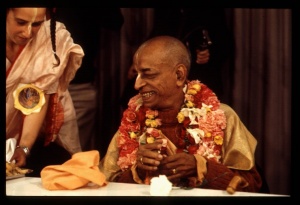CC Madhya 8.88 (1975): Difference between revisions
(Vanibot #0027: CCMirror - Mirror CC's 1996 edition to form a basis for 1975) |
(Vanibot #0020: VersionCompareLinker - added a link to the Version Compare feature) |
||
| Line 2: | Line 2: | ||
<div style="float:left">'''[[Sri Caitanya-caritamrta (1975)|Śrī Caitanya-caritāmṛta (1975)]] - [[CC Madhya (1975)|Madhya-līlā]] - [[CC Madhya 8 (1975)|Chapter 8: Talks Between Śrī Caitanya Mahāprabhu and Rāmānanda Rāya]]'''</div> | <div style="float:left">'''[[Sri Caitanya-caritamrta (1975)|Śrī Caitanya-caritāmṛta (1975)]] - [[CC Madhya (1975)|Madhya-līlā]] - [[CC Madhya 8 (1975)|Chapter 8: Talks Between Śrī Caitanya Mahāprabhu and Rāmānanda Rāya]]'''</div> | ||
<div style="float:right">[[File:Go-previous.png|link=CC Madhya 8.87 (1975)|Madhya-līlā 8.87]] '''[[CC Madhya 8.87 (1975)|Madhya-līlā 8.87]] - [[CC Madhya 8.89 (1975)|Madhya-līlā 8.89]]''' [[File:Go-next.png|link=CC Madhya 8.89 (1975)|Madhya-līlā 8.89]]</div> | <div style="float:right">[[File:Go-previous.png|link=CC Madhya 8.87 (1975)|Madhya-līlā 8.87]] '''[[CC Madhya 8.87 (1975)|Madhya-līlā 8.87]] - [[CC Madhya 8.89 (1975)|Madhya-līlā 8.89]]''' [[File:Go-next.png|link=CC Madhya 8.89 (1975)|Madhya-līlā 8.89]]</div> | ||
{{CompareVersions|CC|Madhya 8.88|CC 1975|CC 1996}} | |||
{{RandomImage}} | {{RandomImage}} | ||
==== TEXT 88 ==== | ==== TEXT 88 ==== | ||
<div class="verse"> | <div class="verse"> | ||
:paripūrṇa-kṛṣṇa-prāpti ei | :paripūrṇa-kṛṣṇa-prāpti ei 'premā' haite | ||
:ei premāra vaśa | :ei premāra vaśa kṛṣṇa--kahe bhāgavate | ||
</div> | </div> | ||
| Line 25: | Line 24: | ||
<div class="translation"> | <div class="translation"> | ||
"Complete attainment of the lotus feet of Lord Kṛṣṇa is made possible by love of Godhead, specifically mādhurya-rasa, or conjugal love. Lord Kṛṣṇa is indeed captivated by this standard of love. This is stated in Śrīmad-Bhāgavatam. | |||
</div> | </div> | ||
| Line 32: | Line 31: | ||
<div class="purport"> | <div class="purport"> | ||
To explain the topmost quality of conjugal love, Śrīla Kṛṣṇadāsa Kavirāja Gosvāmī gives the example of the material | To explain the topmost quality of conjugal love, Śrīla Kṛṣṇadāsa Kavirāja Gosvāmī gives the example of the material elements-sky, air, fire, water and earth. In the sky (space) there is the quality of sound. Similarly, in air there are the qualities of sound and touch. In fire, there are three qualities-sound, touch and form. In water there are four qualities-sound, touch, form and taste. Finally, in earth there are all five qualities-sound, touch, form, taste and also smell. Now, one can see that the quality of the sky is in all-namely in air, fire, water and earth. In earth we can find all the qualities of material nature. The same can be applied to the rasa known as mādhurya-rasa, or conjugal love. In conjugal love there are the qualities of neutrality, servitorship, fraternity and paternal affection, as well as conjugal love itself. The conclusion is that through conjugal love the Lord is completely satisfied. | ||
Conjugal love (mādhurya-rasa) is also known as śṛṅgāra-rasa. It is the conclusion of Śrīmad-Bhāgavatam that in the complete combination of loving service to the | Conjugal love (mādhurya-rasa) is also known as śṛṅgāra-rasa. It is the conclusion of Śrīmad-Bhāgavatam that in the complete combination of loving service to the Lord-namely in conjugal love-the Supreme Lord fully agrees to be under the control of the devotee. The highest form of conjugal love is represented by Śrīmatī Rādhārāṇī; therefore in the pastimes of Rādhā and Kṛṣṇa we can see that Kṛṣṇa is always subjugated by Śrīmatī Rādhārāṇī's influence. | ||
</div> | </div> | ||
Latest revision as of 20:27, 27 January 2020

A.C. Bhaktivedanta Swami Prabhupada
TEXT 88
- paripūrṇa-kṛṣṇa-prāpti ei 'premā' haite
- ei premāra vaśa kṛṣṇa--kahe bhāgavate
SYNONYMS
paripūrṇa—completely full; kṛṣṇa-prāpti—achievement of the lotus feet of Lord Kṛṣṇa; ei—this; premā—love of Godhead; haite—from; ei premāra—of this type of love of Godhead; vaśa—under the control; kṛṣṇa—Lord Kṛṣṇa; kahe—it is said; bhāgavate—in Śrīmad-Bhāgavatam.
TRANSLATION
"Complete attainment of the lotus feet of Lord Kṛṣṇa is made possible by love of Godhead, specifically mādhurya-rasa, or conjugal love. Lord Kṛṣṇa is indeed captivated by this standard of love. This is stated in Śrīmad-Bhāgavatam.
PURPORT
To explain the topmost quality of conjugal love, Śrīla Kṛṣṇadāsa Kavirāja Gosvāmī gives the example of the material elements-sky, air, fire, water and earth. In the sky (space) there is the quality of sound. Similarly, in air there are the qualities of sound and touch. In fire, there are three qualities-sound, touch and form. In water there are four qualities-sound, touch, form and taste. Finally, in earth there are all five qualities-sound, touch, form, taste and also smell. Now, one can see that the quality of the sky is in all-namely in air, fire, water and earth. In earth we can find all the qualities of material nature. The same can be applied to the rasa known as mādhurya-rasa, or conjugal love. In conjugal love there are the qualities of neutrality, servitorship, fraternity and paternal affection, as well as conjugal love itself. The conclusion is that through conjugal love the Lord is completely satisfied.
Conjugal love (mādhurya-rasa) is also known as śṛṅgāra-rasa. It is the conclusion of Śrīmad-Bhāgavatam that in the complete combination of loving service to the Lord-namely in conjugal love-the Supreme Lord fully agrees to be under the control of the devotee. The highest form of conjugal love is represented by Śrīmatī Rādhārāṇī; therefore in the pastimes of Rādhā and Kṛṣṇa we can see that Kṛṣṇa is always subjugated by Śrīmatī Rādhārāṇī's influence.